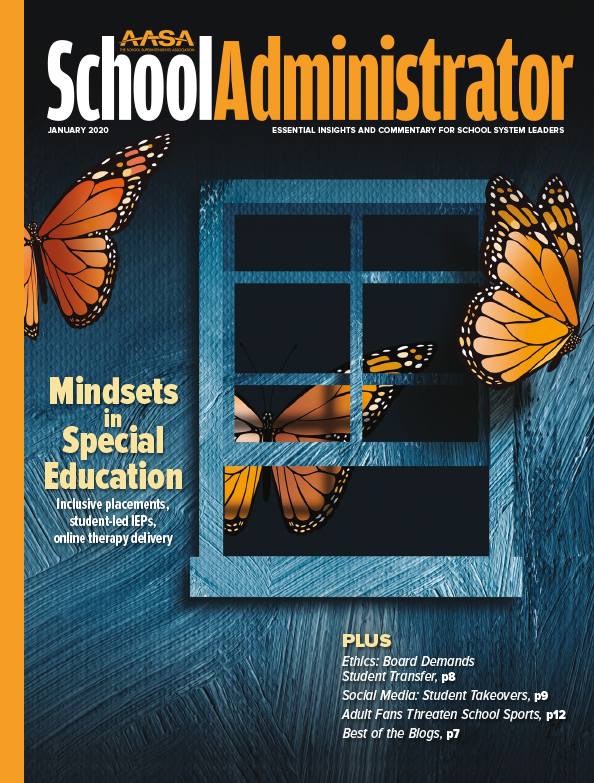2024 Winter Journal of Scholarship and Practice

In this issue, Ken Mitchell has assembled a selection of articles that examine a set of complex and common challenges related to equity, technology integration, effects of the pandemic, and the design of future-oriented instruction. As Mitchell says, “While these topics may seem disparate, all intersect around a common theme of leadership’s ability to adapt and innovate through collaboration.”
In the first article, written by Lisa Flanders-Dick, Joanne Hood, Dustin Hebert and Ric Shrubb, the evidence-based practice piece, states that “school systems consist of multiple levels, including the classroom, school, district, and state and the decisions at one level affect other levels and the stakeholders within a system.” They emphasize the importance of leadership in attending to the complexity of a school system’s multi-level structure to avoid the risk of ignoring influence within its complex layers.
The second article is a research-based piece written by Norma Martinez, Antonio Corrales and Michelle Peters. The research focuses on how effective technology integration comes from teachers and describes the importance not only of a principal’s acceptance of instructional technology but leadership support of related professional development. Readers will see how the engagement of leaders with their staff, especially in fostering learning organizations, brings success.
The third piece is a research article where Michigan State researchers Kyle Dunbar and Aman Yadav reflect on the intersection of equity, technology, and learning. The writers encourage leaders to move beyond a micro-focus on academic gaps to look at how well they are incorporating technology to achieve a “compelling instructional vision for equity,” and from there use these new tools to consider students’ lived experiences, cultures, and identities in instructional design.
Advertisement
Additional Articles
-
 Adaptive Leadership for Complex Decision-making in Extraordinary Times
Adaptive Leadership for Complex Decision-making in Extraordinary TimesIt takes work to become a forward-thinking leader.
-
 Multi-Level Educational Leadership Model: Meeting the Needs of the 21st Century Classroom
Multi-Level Educational Leadership Model: Meeting the Needs of the 21st Century ClassroomResults of this study lead to the development of the Team Empowered Leadership Model
-
 The Influence of COVID-19 on Campus Leaders’ Curriculum Integration, Perceptions Towards, and Acquired Expertise in Technology
The Influence of COVID-19 on Campus Leaders’ Curriculum Integration, Perceptions Towards, and Acquired Expertise in TechnologyThis study investigates the impact of COVID-19 on Texas K-12 campus leaders' curriculum integration and perceptions of technology.
-
 Moving Beyond the ‘Digital Divide’: Three Steps for an Anti-racist Approach to Equitable Participation in K-12 Schools
Moving Beyond the ‘Digital Divide’: Three Steps for an Anti-racist Approach to Equitable Participation in K-12 SchoolsThis research article advocates for a shift from one-to-one device access towards an anti-racist approach to technology integration in schools.
Thanks and Appreciation
The AASA Journal of Scholarship and Practice would like to thank AASA, The School Superintendents Association, and in particular AASA’s Leadership Network, for its ongoing sponsorship of the Journal. We also offer special thanks to Kenneth Mitchell, Manhattanville University, for his efforts in selecting the articles that comprise this professional education journal and lending sound editorial comments to each volume. The unique relationship between research and practice is appreciated, recognizing the mutual benefit to those educators who conduct the research and seek out evidence-based practice and those educators whose responsibility it is to carry out the mission of school districts in the education of children. Without the support of AASA and Kenneth Mitchell, the AASA Journal of Scholarship and Practice would not be possible.
Interested in submitting an article? Learn more here
Additional Resources
- Read previous issues of the Journal of Scholarship and Practice
- Browse the latest resources on the all new AASA.org
- Access the latest advocacy updates on The Leading Edge Blog
- Read the latest issue of School Administrator magazine
- View upcoming AASA events and programs
Advertisement
Advertisement



